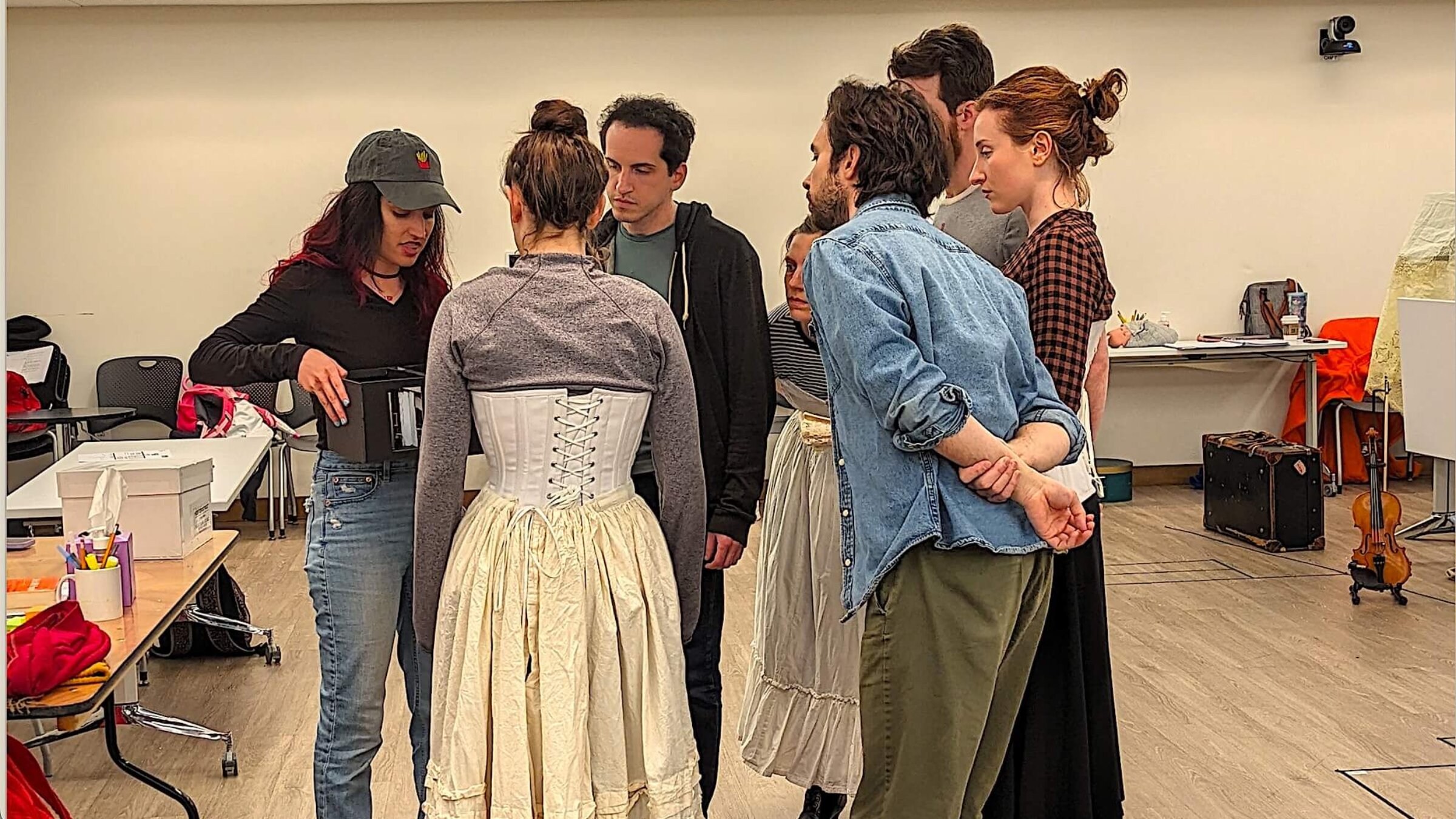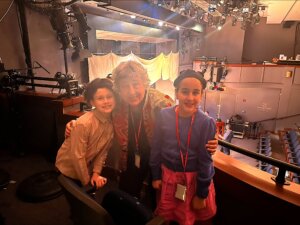Training the ‘Hester Street’ actors how to pronounce their Yiddish lines
Yiddish dialogue coach Miriam Isaacs found the actors, especially the children, in the new play quick and eager learners.

At a rehearsal of “Hester Street” Courtesy of Theater J
The work of a Yiddishist often takes unexpected twists, some quite delightful. My current stint has brought me into the world of theater as the Yiddish language coach for a new play, Hester Street, by Sharyn Rothstein.
This drama of Jewish immigrant life in New York contains considerable Yiddish and Yinglish dialogue and is based on the 1975 film by Joan Micklin Silber. That, in turn, is based on the novella Yekl, written in 1896, in highly erudite English by Abraham Cahan, founder of the Jewish Daily Forward. Cahan’s English was very high register (he must have swallowed a thesaurus) but his text contains many oddly spelled renderings of Yinglish. Even more surprising is that his attitude towards Yiddish in the story is strikingly condescending.
Hester Street centers on the pains of assimilation, frustration and shame, as immigrants learned to adapt to America. Cahan referred to his characters as speaking “broken” English, and referred to Yiddish with the pejorative term “jargon.” At that time, Yiddish was often not viewed as a proper language, even by its own speakers. As Cahan wrote, they were “speaking all sorts of sub-dialects of the same jargon, thrown pell mell into one social cauldron — a human hodgepodge with its component parts changed but not yet fused into one homogeneous whole.” His text is fused with a mish mash of mocking mispronunciations amid a moving account of the pains of learning a language and adapting to a new life.
Theater J’s Artistic Director, Hayley Finn, brought me in to assure the quality of the Yiddish dialogue, and I’ve been working closely with the full crew, and especially the lead actors. I’ve never witnessed how a drama comes to life. A writer usually condenses real flesh-and-blood people to paper; inversely, theater brings a script to real life. I was able to work with living, breathing actors who strive to inhabit their characters, imbue them with emotion, with their voices. From the first rehearsal, the team — including the actors, producers, musicians, dialect coach, choreographer, costume and set designers — welcomed me with open arms.
I’m gratified to see the attention paid to quality, because often in the past people who care little about correct Yiddish have subjected audiences and me to substandard Yiddish as if it doesn’t matter. I don’t like to see my native language treated like a stepchild. Here, I worked closely with the playwright-director Oliver Butler and the actors, to get things right. Fortunately, attitudes to Yiddish have changed dramatically regarding issues of language competence, of mixing languages, and the acceptability of mocking foreign accents. The actors were eager to inhabit their roles genuinely.
The protagonist, Jake (Yekl), played by Jake Horowitz, is caught between two worlds and switches frequently from Yiddish to a heavily accented English. A lowly textile worker, he feels superior when he brings his version of Yinglish to his traditional wife, Gitl (Sara Kapner). Their young son Yosl (Joey, played by 8-year old Katey Angell and a child understudy, Alexandra Moore) teaches the mother English as he labels items around the home, “tebl,” “vinda” and chair. I found the actors, especially the children, eager and quick learners. Katey even signed up to study Yiddish online.
The script is in a mixture of English, Yinglish and Yiddish and the actors have to memorize considerable Yiddish dialogue. I worked with them in group settings and one on one. The initial process of language coaching was intense. There were issues of grammar, word choice, phrasing, intonation and body language. To my surprise, I often summoned up memories of my greenhorn, immigrant parents and their friends, hearing in my mind how they would have pronounced or said things in their Yiddish and in their heavily accented English.
Dani Stoller, playing Mrs. Kavarsky, conjured up a fine Russian accent that was close enough to a Yiddish accent to be credible. I had seen her in a previous Theater J production, when she played Stalin’s daughter.
There were many fun moments amid long hours of rehearsal. Michael Perrie Jr. in the character of Mr. Bernstein plays a traditional Jew. He told me the serious role was challenging for him, because he’s a trained clown. I helped in many ways to bridge the cultural and linguistic divide between Yiddish and English. I encouraged the actors to watch old episodes of

The. Goldbergs to hear the intonation and cadences of Yiddish and also to see the body language. Certain kinds of body language characterized Eastern European Jews, especially the use of hands to express emotions, movement, tempo and more. Mannerisms are important as well. At one point, I suggested that when a character cursed, she ought to add an audible spit to lend authenticity.
The convoluted history of Yiddish in the case of Yekl carried with it layers of renderings, from Cahan’s strange attempts at phonetic spelling to partial translations. Here is just one example. When Gitl sings a Yiddish song to her son, I know it as one of my favorite children’s songs, one collected by Ruth Rubin, the well-known ethnomusicologist. It starts out strangely with a line about a poodle. How did a poodle get in there? Well, the song, a cumulative nonsense song begins with oxen who crumble some noodles. Well, oxen, “oksn” in Yiddish rhymes with “lokshn,” noodles. And in English, “noodles” rhymes with “poodles.” I was happy to bring it to its original form.
I find the entire process fascinating. Tomorrow afternoon I am going to work with the crew to make sure that the Yiddish spoken by the actors will line up with the projected English translations overhead on screens consisting of clothes lines. I know I appreciate the many people with whom I have worked in this intense period. I have striven to untangle the layers of Yiddish and Yinglish emerging from the assorted spellings and semi-phonetic pronunciations, the end being a credible and emotional story of a community of immigrants struggling in the process of adapting to a new life in New York.
“Hester Street” will run until April 21 at Theater J in Washington, DC





















